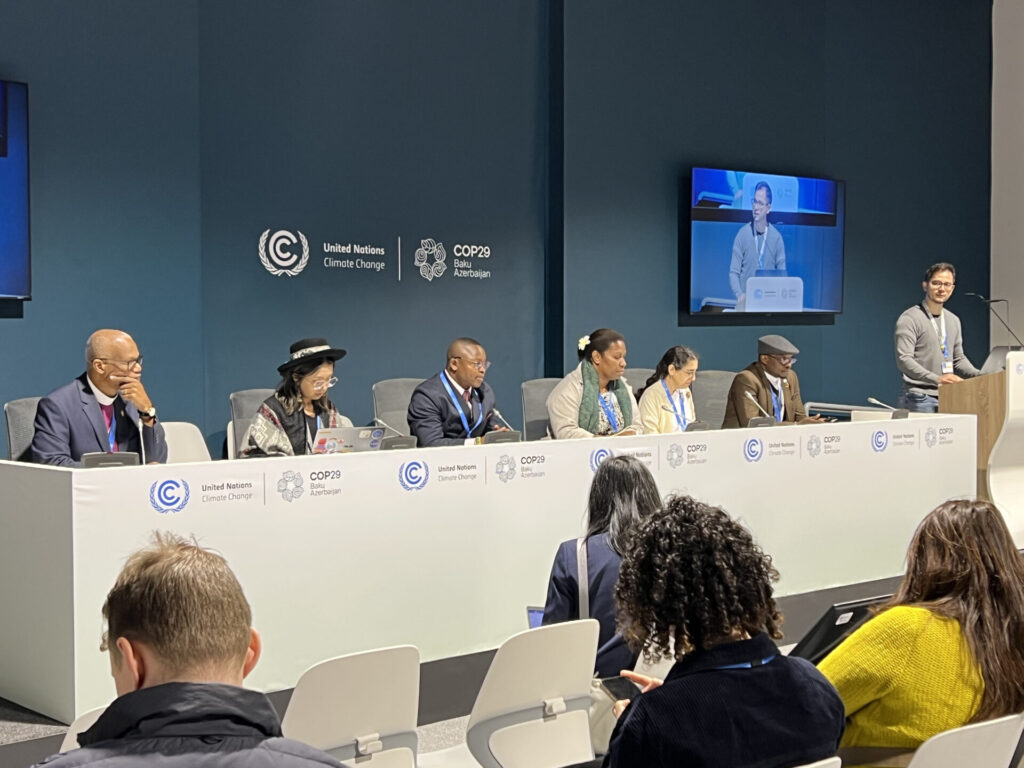
On November 15, 2024, a compelling side event took place at COP29 in Baku, Azerbaijan, highlighting the often-overlooked yet critical issue of non-economic loss and damage (NELD) caused by climate change. Co-organized by the Lutheran World Federation, Franciscans International, World Council of Churches, Dominicans for Justice and Peace, Brahma Kumaris, All Africa Conference of Churches, and the Evangelical Lutheran Church of America, this session offered a faith-based perspective on the intangible impacts of the climate crisis.
Moderated by Igor Bastos of the Laudato Si’ Movement and Rev. Dr. Lesmore G. Ezekiel of the All Africa Conference of Churches, the event brought together prophetic voices, including Indigenous leaders, youth activists, and faith-based advocates. The discussions centered on losses that cannot be quantified—cultural heritage, spiritual connections, human dignity, and the erosion of communal bonds—issues often marginalized in climate policy and negotiations.
Key Themes and Insights
The panel featured six diverse speakers:
- Wara Iris Condori (Bolivia) shared how Indigenous communities face profound disruptions to their cultural and ancestral ways of life due to climate-induced migration and environmental degradation.
- Ms. Stephanie Stephen (Vanuatu negotiator) highlighted her country’s experience as part of the Small Island Developing States (SIDS), grappling with slow-onset events and how existing mechanisms like the Warsaw International Mechanism, Santiago Network and the Fund for Responding Loss and Damage have yet to fully address their communities’ needs.
- Maro Maua (Kenya) passionately spoke as a youth climate activist, urging the world to amplify young voices and push for meaningful action before it’s too late to limit global warming to 1.5°C.
- Archbishop Julio Murray (Panama) emphasized the necessity of a faith-based perspective to frame NELD discussions around justice, resilience, and dignity. The faith communities have always and will always be the affected communities, in particular when the government fails to do their responsibility.
- Sister Maureen Goodman (UK) called for recognizing women’s unique role in climate advocacy, particularly as they often bear the brunt of the climate crisis and offer prophetic leadership in response.
Faith-Based Advocacy and NELD
Faith-based organizations are uniquely positioned to address non-economic loss and damage by bringing moral and ethical dimensions into climate justice discussions. The speakers underscored that NELD must be integrated into the Loss and Damage actions to ensure that vulnerable communities are supported not only in material recovery but also in preserving their cultural and spiritual identities.
Closing Reflections
As the session drew to a close, Igor Bastos reminded participants of the prophetic responsibility we all share: to be voices of justice, peace, and care for creation. By addressing non-economic losses, we affirm the human side of the climate crisis, ensuring that policies and actions reflect the dignity and resilience of affected communities.
This side event at COP29 served as a timely reminder of the need to advocate for holistic climate solutions. Faith-based organizations, grounded in principles of compassion and justice, continue to lead the charge in ensuring that no voice is left unheard, especially in the global discourse on loss and damage.





